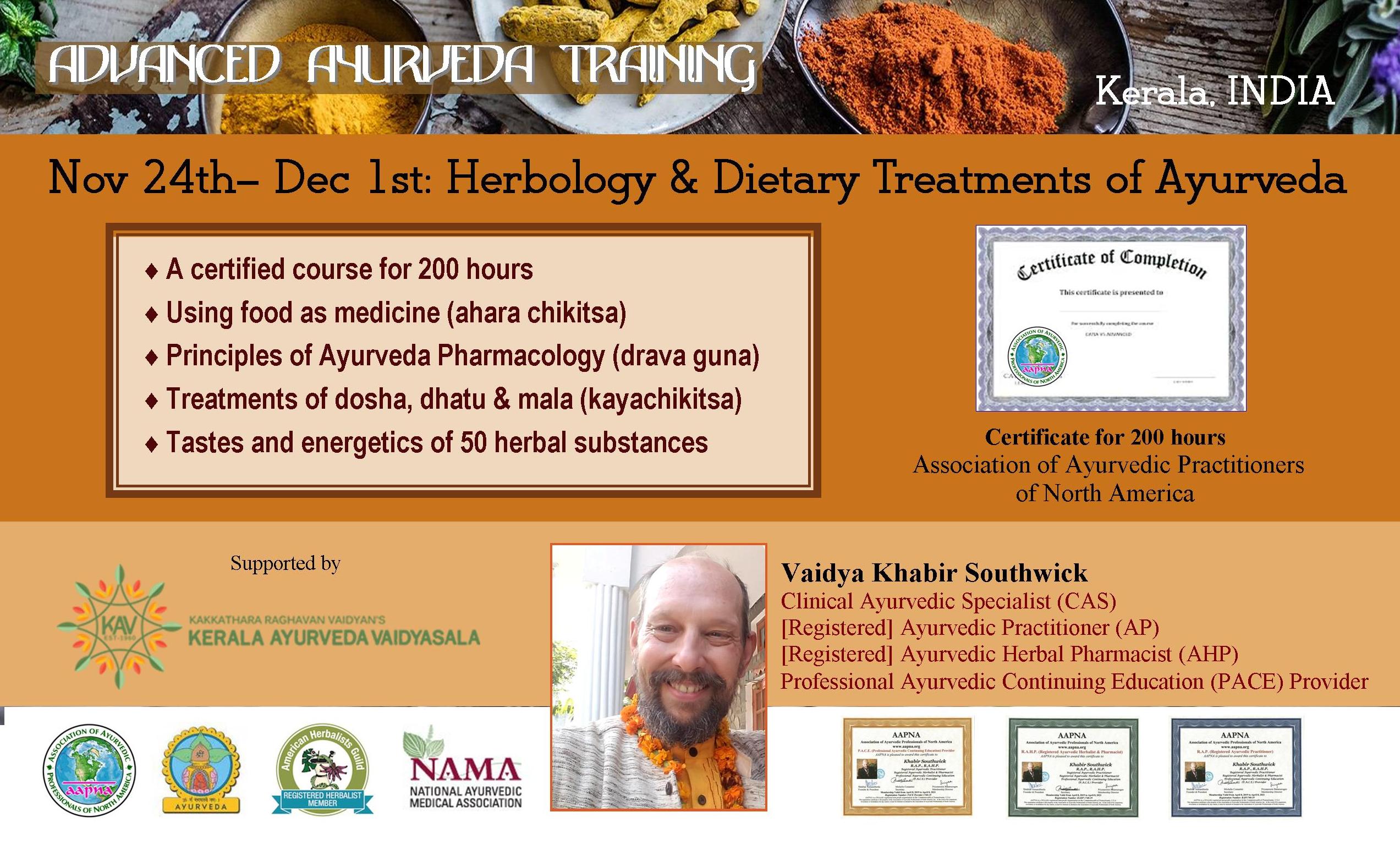8-day 200 hr workshop: Herbology and Dietary Treatments of Ayurveda

Herbology and Dietary Treatments of Ayurveda
- Nov. 24th to Dec. 1st, 2019, , Fort Kochi, Kerala, South India.
About the Programs
These intensive workshops are about learning the skills necessary to practice Ayurveda in a clinical environment based on traditional Ayurvedic principles (Charaka & Samhita), methodologies of treatment (kayachikitsa) as per Northern India, Ayurvedic herbology (dravyaguna) and Ayurvedic pharmacology (Bhaisajya Kalpanaa). Note: The northern Indian approach is almost entirely herbal compared with the southern or Kerala approach where abhyanga, the use of oils, sweating therapies, Shirodhara and panchakarma are the main methods of treatment. Thus, these workshops do not cover these physical forms of treatment or any form of bodywork, since a purely herbal and dietary approach is sufficient if the practitioner is skilled.
This teaching format is in the traditional teacher-student approach or gurukul in India for those who want hands-on training in Ayurvedic health-care (kayachikitsa) by experienced Ayurvedic Doctors and Vaidya. Most courses on Ayurveda are more focused on theory than clinical application, or too academic, with references to original sanskrit texts requiring an understanding of Sanskrit terminology. The goal of these workshops is to help [western] students and practitioners of Ayurveda to better grasp the functional and clinical applications of Ayurveda and provide a model of private practice that can be used in the West.
Each full day, there are 5 hours of small group teaching with 3 hours in the morning and 2 hours in the late afternoon. The classes are straightforward and clear without much Sanskrit terminology using modern english textbooks by Vasant Lad, Atreya Smith and others.
Herbology and Dietary Treatments of Ayurveda
Course Syllabus
Textbooks: Ayurvedic Herbology East & West: A Practical Guide to Ayurvedic Herbal Medicine (on Amazon) and Ayurvedic Medicine for Westerners: Clinical Protocols & Treatments in Ayurveda (Volume 3) (on Amazon).
200 hours of training
- Self study before the course: 150 hours
- Teaching by Khabir (India) – 8 days, 30 hours
- Group and individual study in India: 20 hours
Overview:
The main objective of this course is to understand the attributes (gunas), actions (karma) and taste (rasa) of most vegetables, fruits, grains, nuts, and other food items, and learn to form diets to therapeutically address specific health conditions (ahara chikitsa). Additionally, we will study 50 of the most common traditional ayurvedic herbs, and simple formulas to address doshic imbalances and the subdoshas. Participants will role-play daily to practice prescribing dietary and herbal formulas [based on the herbs covered in the lessons each day].
Note: The northern Indian approach is almost entirely herbal compared with the southern or Kerala approach where abhyanga, the use of oils, sweating therapies, Shirodhara and panchakarma are the main methods of treatment. Thus, these workshops do not cover these physical forms of treatment or any form of bodywork, since a purely herbal and dietary approach is sufficient if the practitioner is skilled.“
Course Outline:
Daily: Introduction to 50 most used Ayurveda Herbs
- Sanskrit Name, latin name, synonyms,
- Attributes, taste, potency,Post digestive effects,
- Action on doshas and tissues.
- Internal uses, external uses, chemical compositions
Part 1: Using food as medicine (ahara chikitsa)
- Balancing Vata with food and eating habits
- Balancing Pitta with food and eating habits
- Balancing Kapha with food and eating habits
- Variations for kapha-vata, pitta vata, kapha-pitta, etc
Part 2: Principles of Ayurveda Pharmacology (drava guna)
- Type of herbal substances (dravyas)
- The 20 gunas (qualities of herbal substances)
- Tastes and energetics of herbal substances: rasas, vipak, veeya, prabhav
- Actions of herbal substances: Karma
Part 3: Treatments for imbalances of dosha, dhatu, mala (Shamana Chikitsa)
Specific herbs to balance:
- Prana, udana, apana, samana, vyana vayu (vata)
- Panchaka, ranjanka, bhrajaka, sadhaka, alochoka pitta
- Kledaka, avalambaka, bodhaka, tarpaka, shlesshaka khapa
- Manda, tikshan, vishama and sama agni
- Prana, tejas and ojas
Dietary and herbal treatments for:
- The respiratory system (prana vaha sroto)
- The digestive system (anna vahu sroto)
- The water system (Ambu sroto)
- Conditions of the lymph (rasa sroto & dhatu)
- conditions of the blood-liver-spleen (rakta sroto & dhatu)
- Conditions of the muscles (mamsa sroto & dhatu)
- Conditions of fat tissue (meda sroto & dhatu)
- Conditions of the joints and bones (ashti sroto & dhatu)
- Conditions of the nervous system (meja sroto & dhatu)
- Conditions of the reproductive system male/female (shukra/Artava sroto & dhatu)
- The colon (purisha sroto)
- The sweat glands (sveda sroto)
- The urinary system (Mutra sroto)
Additional information & testimonials.
Costs
US$750 for the 8-day workshop
Includes Accommodation for 7 nights, Certification of Completion for 200 hours of study and some meals: includes a private private room with an attached bathroom and room service, an evening dinner on the first day and breakfast on the last day. Additionally available: herbal shopping tours, room cleaning service, lectures by guest speakers, access to Panchakarma treatments at reduced rates, close-by shopping and local entertainment.
Event Details
| Date & Start Time | 11-24-2019 6:00 pm |
| End Time & Date | 12-01-2019 1:00 pm |
| Capacity | 10 |
| Cost(s) | $750 |